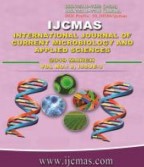


 National Academy of Agricultural Sciences (NAAS)
National Academy of Agricultural Sciences (NAAS)

|
PRINT ISSN : 2319-7692
Online ISSN : 2319-7706 Issues : 12 per year Publisher : Excellent Publishers Email : editorijcmas@gmail.com / submit@ijcmas.com Editor-in-chief: Dr.M.Prakash Index Copernicus ICV 2018: 95.39 NAAS RATING 2020: 5.38 |
The improvement of woody fruit species by conventional plant breeding techniques has several limitations because of high degree of heterozygosity, lengthy juvenile period and auto-incompatibility. The development of new biotechnological tools (NBTs), such as RNA interference (RNAi), trans-grafting, cisgenesis/intragenesis, and genome editing tools, like zinc-finger and CRISPR/Cas9, has introduced the possibility of more precise and faster genetic modifications of plants. For the introduction or modification of specific traits in woody fruit species while maintaining unchanged general characteristics of a selected cultivar, this aspect is of particular importance. Over the decades biotechnological tools have undergone rapid development and there is a continuous addition of new and valuable techniques for plant breeders. This makes it possible to create desirable woody fruit varieties in a fast and more efficient way to meet the demand for sustainable agricultural productivity. In mid ninety’s RNA interference (RNAi) added a new dimension in the regulation of gene expression by different types of RNA. Down regulation of the expression of specific genes through RNAi, has been widely used for genetic research (Agarwal et al., 2003; Mansoor et al., 2006; Angaji et al., 2010). The technique has revolutionized the studies on basic biological phenomenon and unrevealed many hidden facts in every domain of biological science including Agriculture. This review article summarizes the applications of RNA interference in fruit plants for functional genomics, quality improvement and disease and insect -pest resistance.
 |
 |
 |
 |
 |